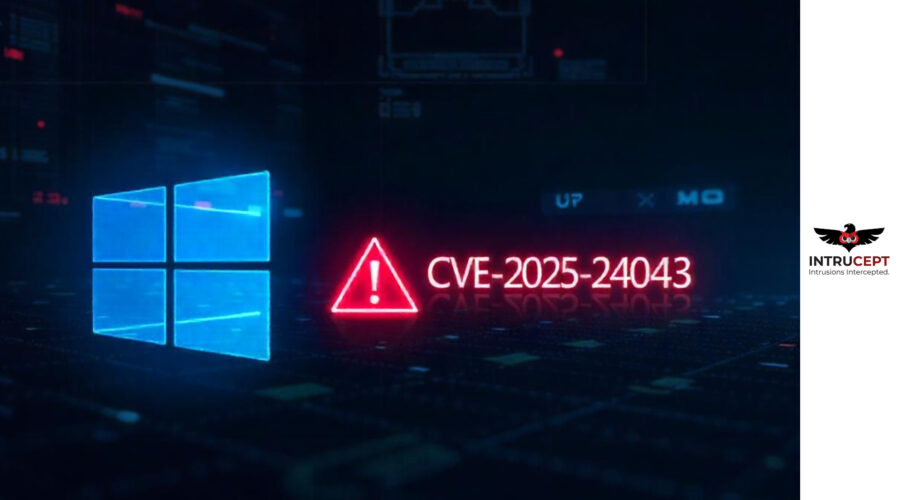High-Severity RCE Vulnerability in WinDbg (CVE-2025-24043)
Security Advisory
A high-severity remote code execution (RCE) vulnerability exists in Microsoft’s WinDbg debugging tool and related .NET diagnostic packages.
The vulnerability poses severe supply chain risks, as WinDbg is widely embedded in CI/CD pipelines and enterprise developer toolchains.
Compromised debugging sessions could lead to lateral movement across networks, credential theft, persistent backdoor injections, and disruption of crash dump analysis workflows.
Microsoft confirmed no viable workarounds other than immediate patching, as the lack of certificate pinning in the affected packages worsens the risk, enabling attackers to leverage forged or stolen Microsoft Authenticode certificates.
| OEM | Microsoft |
| Severity | HIGH |
| CVSS | 7.5 |
| CVEs | CVE-2025-24043 |
| Publicly POC Available | No |
| Patch/Remediation Available | Yes |
| Advisory Version | 1.0 |
Overview
This issue is caused by insufficient validation of cryptographic signatures in the SOS debugging extension, potentially allowing attackers with network access to execute arbitrary code. Microsoft has released patches to address the vulnerability.
| Vulnerability Name | CVE ID | Product Affected | Severity |
| Remote Code Execution Vulnerability | CVE-2025-24043 | Microsoft Windows | High |
Technical Summary
The vulnerability arises from the SOS debugging extension’s failure to properly validate cryptographic signatures during debugging operations.
This enables attackers with authenticated network access to inject malicious debugging components, leading to arbitrary code execution with SYSTEM privileges. The attack vector leverages NuGet package integrations in Visual Studio and .NET CLI environments, increasing the risk of supply chain compromises.
| CVE ID | System Affected | Vulnerability Details | Impact |
| CVE-2025-24043 | WinDbg and associated .NET diagnostic packages | Flaw in cryptographic signature validation in the SOS debugging extension allows tampered components to be loaded. | Arbitrary code execution |
Remediation:
- Update Affected Packages: Ensure that all instances of affected NuGet packages are updated to the latest patched versions. Refer to the table below for the affected and patched versions.
- Upgrade WinDbg: Make sure that WinDbg is updated to the most recent release available.
- Audit Dependencies: Review all .NET Core project dependencies to identify and replace vulnerable packages.
- Monitor Network Activity: Implement monitoring for any suspicious network activity related to windbg.exe.
- Enforce Security Policies: Apply security policies, such as Windows Defender Application Control, to prevent the execution of unsigned debugging components.
The table below outlines the affected and patched versions of the relevant packages:
| Package Name | Affected Version | Patched Version |
| dotnet-sos | < 9.0.607501 | 9.0.607501 |
| dotnet-dump | < 9.0.557512 | 9.0.607501 |
| dotnet-debugger-extensions | 9.0.557512 | 9.0.607601 |
Conclusion:
CVE-2025-24043 highlights the need to secure developer toolchains, as debugging environments are becoming more targeted in cyberattacks. Organizations using .NET diagnostics should quickly apply patches and implement strict security measures to reduce the risk of exploitation. With no effective workarounds available, postponing remediation heightens the chances of an attack. Prompt action is essential to safeguard critical development and production environments.
The security impact extends beyond developers, as the exploitation of debugging tools could facilitate attacks on production infrastructure.
Additional security measures include certificate transparency logging for NuGet packages and enforcing Windows Defender Application Control (WDAC) policies to restrict unsigned debugger extensions. While no active exploits have been reported, the patching window is critical, and organizations using .NET diagnostics must act immediately before threat actors weaponize the vulnerability.
References:
- https://securityonline.info/windbg-remote-code-execution-vulnerability-cve-2025-24043-exposes-critical-security-risk/





